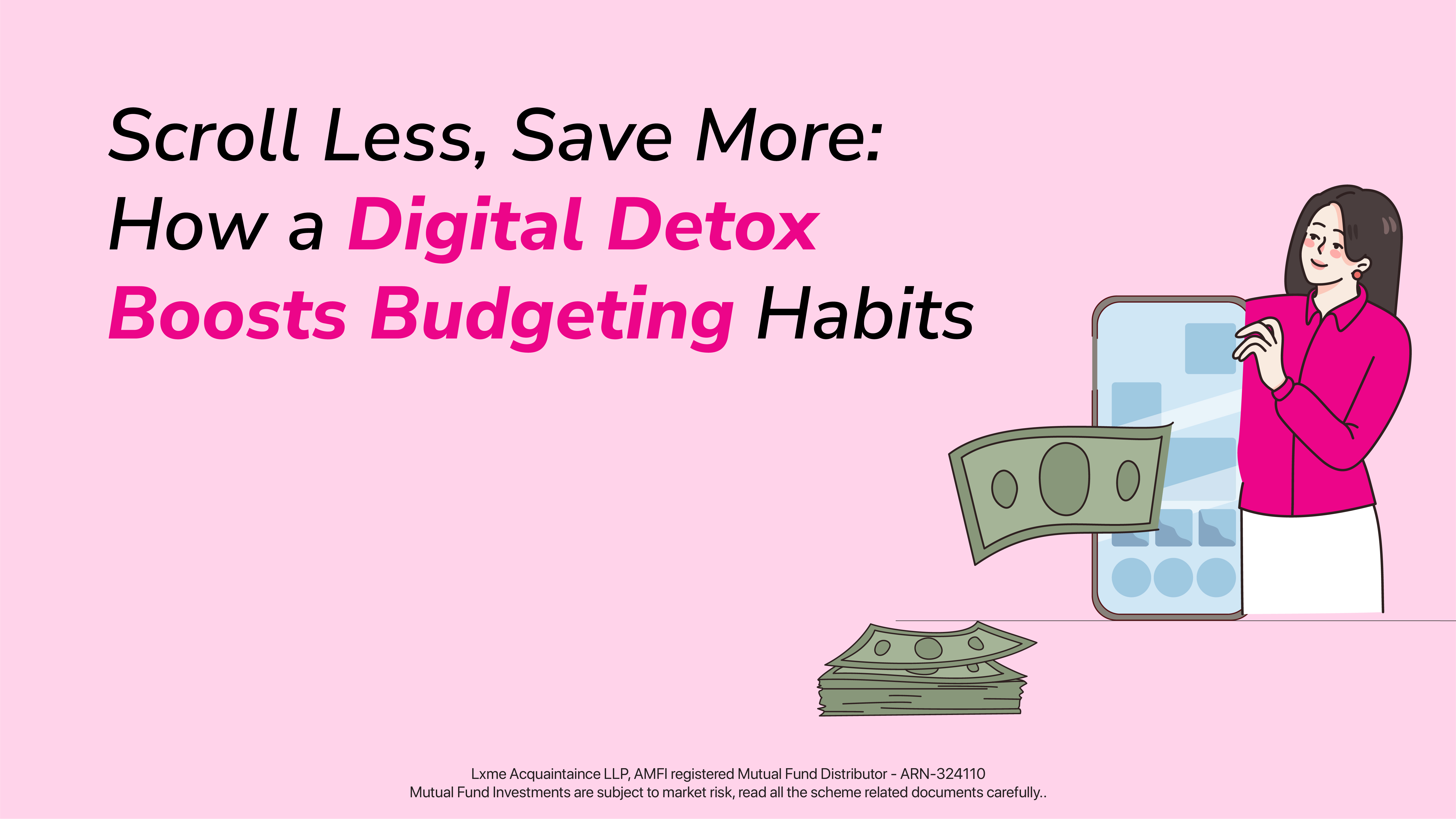Let’s be honest — none of us planned for our phone screens to become our second home. One “just a quick Insta check” turns into 30 minutes of scrolling before we even realize it. We’ve laughed at memes from that one friend who always sends them, stalked influencers’ outfits, and maybe even ended up buying something that wasn’t in our budget. It’s not just about screen time anymore; it’s about how those extra swipes can quietly drain both our time and our wallets.
From personal and professional experience, we know this is especially true for women. We’re constantly balancing household budgets, personal savings, and our own well-deserved little indulgences. That’s why connecting the dots between digital detox and money habits can be eye-opening. Once you see how your scrolling habits affect your spending habits, you’ll never look at “just five more minutes online” the same way again.
Instead of mindless scrolling, you could start small with a digital gullak that helps you save and grow money without even noticing the effort. Or if you want to go a step further, you can invest money online with beginner-friendly options explained in simple language. And while you’re at it, building financial literacy for women ensures that every rupee you save and invest works harder for you.
1. The Swipe-Scroll-Spend Loop
Every swipe comes with a direct or indirect cost. Social media algorithms are designed to show us things we might want to buy. That limited-time sale, that “must-have” beauty kit, or that friend showing off her latest travel haul, it’s all a nudge to spend.
Reducing your screen time can directly reduce impulse spending. In fact, studies show that people who consciously reduce screen time and save money see the difference within the first month.
The best thing to do is to keep a “buying delay” rule. Whenever you see something online, add it to your cart or wishlist and wait 48 hours before deciding. Most of the time, you won’t feel the same urge to buy.
2. Replacing Scroll Time With Self-Time
If you’re wondering how to do a digital detox without feeling restless, the key is replacement — not restriction.
Rather than spending time on social media scrolls, hop on activities that fill your mind but don’t utilize your savings. Reading, journaling, learning a recipe, or even trying at-home workouts can feel relaxing and productive.
And yes, this is where budgeting tips for millennials get real, because the time you free up from scrolling online without a purpose can be redirected towards tracking your expenses, setting saving goals, or even learning about investments that work for you.
Set aside 20 minutes each day for mindful money planning. You can use tools like Lxme’s financial calculator to track your expenses in a way that’s actually fun.
3. More Time = More Awareness
When you’re not stuck to your screen, you notice small things, like how often you eat out, or the fact that you have three similar kurtis in your closet. This kind of awareness is the foundation of mindful spending habits.
Screen time reduction helps avoid temptation and creates mental space to tally what you really want, and what’s just been pushed to you through ads and trends. Start to keep a weekly reflection journal. Write down your top 3 purchases of the week, how they made you feel, and whether you’d make the same choice again.
4. Social Media’s Comparison Trap
Here’s the truth, even the most confident among us can get caught in the comparison game. Someone else’s trip, someone else’s new handbag… it can subconsciously shift your own priorities without you even realising it. You are not wrong, you’re just distracted.
By taking a digital detox, you protect your budgeting goals from the silent pressure of keeping up. This is especially important if you’re working towards a big goal like an emergency fund, a solo trip, or a dream home. Make your phone background a visual of your financial goal, your dream kitchen, your desired travel destination, or a motivational quote. It keeps you grounded.
5. Using Screen Time Wisely
Digital detox doesn’t mean abandoning tech, it means using it with intention. For instance, swapping random reels for financial education content is a win-win. If you want to improve your digital detox and money habits, replace 15 minutes of scrolling with watching quick budgeting hacks, investment explainers, or women-focused finance podcasts.
Try Lxme’s Financial Calculators to instantly see how your savings can grow, or how much you need for specific goals. Watching your money’s potential in numbers can be more satisfying than any shopping spree. Want to invest online? Take our FSQ for beginners to know where you stand, and play smart!
6. Small Changes, Big Results
A digital detox doesn’t have to be extreme to be effective. Even 30 minutes less per day can create enough headspace to adopt stronger budgeting practices.
Remember, budgeting tips for millennials often start with small but consistent actions, skipping one online order a week, putting that money into a SIP, or using cashback apps consciously instead of impulsively.
Pair your detox with auto-savings. If you’re reducing food delivery app orders, transfer the same amount into your Lxme Goals Planning — turning temptation into progress.
7. Women Supporting Women
Here’s what makes this conversation special, as women, we understand the nuances of balancing our needs with family expectations, societal norms, and financial independence dreams. A digital detox saves money and helps reclaim our attention and direct it towards our priorities.
It’s choosing to spend on your own terms, not because an algorithm nudged you at 11 PM when you were tired and scrolling. It’s saying, “I’m in charge of my money, my time, and my goals.”
Your Money, Your Move, Your Future
At the end of the day, mindful spending habits aren’t about chasing the “next big thing” just because everyone is talking about it. It’s about making choices today that your future self will thank you for.
We often balance so many roles, at home, at work, and in our communities that thinking about our financial future can slip down the list. But you deserve to have money that works for you, grows for you, and supports the life you dream of.
These high-growth sectors are worth keeping an eye on, but the real responsibility lies in doing your homework, starting small, and staying on track. By investing smarter, you can reduce screen time, save money, and focus on building not just wealth, but true independence. No matter your age or income, you can start investing with confidence today.
FAQ
Can reducing screen time really help me save money?
Yes. When we’re online too much—especially on social media—it’s easy to get tempted by ads, influencer posts, and “limited-time” sales. Cutting down screen time means fewer impulses to buy things you didn’t plan for. Plus, you free up time for hobbies, side hustles, or simply being more mindful about where your money goes.
What apps or habits can replace scrolling but still feel relaxing?
You can replace scrolling with things that give you the same ‘mental break’ but without the spending traps. Try reading a physical book, doing a quick home workout, journaling, or calling a friend. If you still want to use your phone, swap Instagram for a meditation app, an audiobook, or a budgeting tracker—you’ll relax and also make progress towards your goals.
Can a digital detox really improve my financial habits?
Why not! Most “saw it & bought it” purchases start with something that caught your eye online. When you take a break from constant notifications and ads, you’re less exposed to these triggers. This gives you a chance to plan purchases, stick to your budget, and focus on your actual needs instead of trends.
What are some simple digital detox strategies?
You don’t have to delete everything overnight. Start small, set app limits, switch off non-essential notifications, keep your phone out of reach during meals, or have a “no phone after 9 PM” rule. Even an hour a day without your phone can help you be more mindful with your spending.
Further read:












